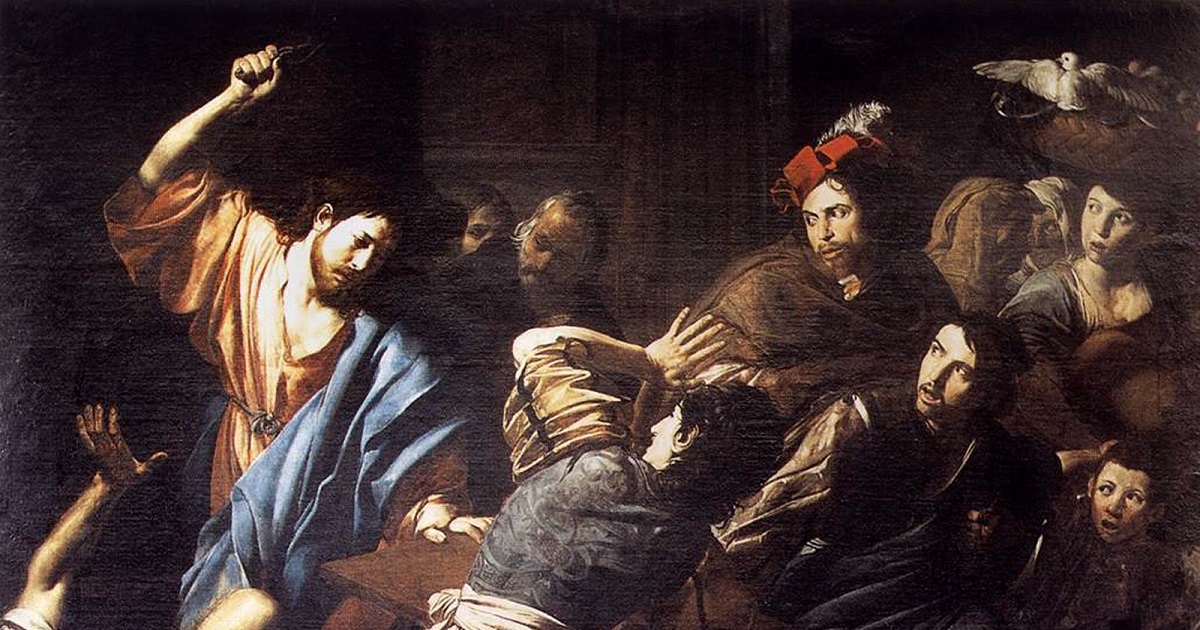
In this mini-series, pastor-scholar Todd Chipman walks us through 5 psalms for Holy Week. Each post is based on his Scripture Storyline: An Invitation to Biblical Theology (Fontes, 2020).
Jesus and the authors of the New Testament employed Psalm 69 to articulate Jesus’ mission and the unfolding of salvation history in the church. The psalmist stated that his hardships resulted from both his sin and his commitment to God (Ps 69:5-12). He felt like he was drowning (Ps 69:1-2, 15) and lamented that he was parched because of his continual weeping (Ps 69:3). The psalmist cried out to God asking that God might destroy his enemies (Ps 69:19-28) and rescue him so that he could praise God to the next generation (Ps 69:13-18, 29-36). The psalmist confessed that God was the cause of his suffering (Ps 69:26) and his only hope of rescue.
Zeal for God’s House
In Ps 69:9a, the psalmist wrote that his devotion to God caused his family members to reject him. John wrote that after Jesus threw the money changers out of the temple, the disciples remembered that it was written, “Zeal for Your house will consume Me” (John 2:17), referencing Ps 69:9a. In the disciples’ collective memory of Psalm 69, Jesus devoted Himself to God and opposed the Jewish leadership. In the Gospel of John, for Jesus to be devoted to God required Him to oppose the Jewish leadership. They responded in kind—and became a threat to the disciples as well.
Hated for No Reason
During the Farewell Discourse in John 13-16, Jesus repeatedly told His disciples what was about to take place. He was about to complete the mission God had given Him and would return to the Father. After He ascended to the Father, He would send the Spirit to empower the disciples. The Spirit would remind the disciples of what Jesus had accomplished and invigorate them to exploit their access to the Father in prayer. Jesus’ blunt tone in the Farewell Discourse fit the situation: the world hated not only Him and the Father, but the disciples as well. Jesus used Ps 69:4 to defend Himself and indict those who rejected His revelation of the Father. Jesus told His disciples that the world hated Him and the Father “So that the statement written in their law might be fulfilled: ‘They hated Me for no reason’” (John 15:25).
The Bitter Taste of Death
When Jesus hung on the cross, He willingly suffered the full extent of physical pain crucifixion would bring upon its victims. The psalmist wrote, “Insults have broken my heart, and I am in despair. I waited for sympathy, but there was none; for comforters, but found no one. Instead, they gave me gall for my food, and for my thirst they gave me vinegar” (Ps 69:20-21). The psalmist wanted some acceptable drink, but his opponents offered him only the sour, bitter drink that would remind him of his destitute condition. When Jesus was on the cross, those standing by offered Him a drink of wine mixed with bitter gall, but Jesus refused to drink it (Matt 27:34//Mark 15:23). Jesus would take no comfort the drink might provide to a thirsty, dying victim.
Hardened for a Season
In Psalm 69, the psalmist asked God to deliver him and destroy his enemies. He wanted God to rage against them, render a guilty verdict against them at the judgement, and erase their names from the book of life (Ps 69:24-28). In Rom 11:9-10, Paul took up Ps 69:23-24 as a description of the hardened state of Israel. Paul wrote, “Let their feasting become a snare and a trap, a pitfall and a retribution to them. Let their eyes be darkened so they cannot see, and their backs be bent continually.” What the psalmist wished for his enemies Paul understood to be taking place in Israel. Israel’s rejection of Jesus as the Messiah demonstrated just how spiritually calloused the nation had become.
Suffering for the Brothers
The psalmist admitted that he committed foolish and guilty acts that might have caused onlookers to turn from God (Ps 69:5-6). But the psalmist cried out that he also shared in God’s reproaches as those who insulted God also insulted him (Ps 69:7). In Ps 69:9b he said, “The insults of those who insult You have fallen on me.” In Rom 15:3, Paul cited Ps 69:9b to describe Jesus’ suffering and call his audience of Jews and Gentiles to suffer for unity in the fellowship of the church. Since Jesus did not please Himself, Paul argued, “Each one of us must please his neighbor for his good, in order to build him up” (Rom 15:2).
Read All the Psalms in Light of the Canon


